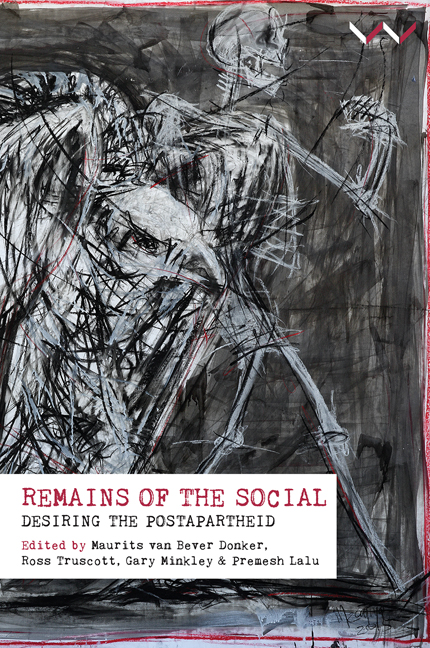Book contents
- Frontmatter
- Contents
- Acknowledgements
- Preface
- Chapter 1 Traversing the Social
- Chapter 2 The Mandela Imaginary: Reflections on Post-Reconciliation Libidinal Economy
- Chapter 3 The Return of Empathy: Postapartheid Fellow Feeling
- Chapter 4 The Ethics of Precarity: Judith Butler's Reluctant Universalism
- Chapter 5 Hannah Arendt's Work of Mourning: The Politics of Loss, ‘the Rise of the Social’ and the Ends of Apartheid
- Chapter 6 Souvenir
- Chapter 7 Re-Cover: Afrikaans Rock, Apartheid's Children and the Work of the Cover
- Chapter 8 The Graves of Dimbaza: Temporal Remains
- Chapter 9 The Principle of Insufficiency: Ethics and Community at the Edge of the Social
- Chapter 10 The Trojan Horse and the ‘Becoming Technical of the Human’
- About the Contributors
- List of Figures
- Index
Chapter 4 - The Ethics of Precarity: Judith Butler's Reluctant Universalism
Published online by Cambridge University Press: 21 April 2018
- Frontmatter
- Contents
- Acknowledgements
- Preface
- Chapter 1 Traversing the Social
- Chapter 2 The Mandela Imaginary: Reflections on Post-Reconciliation Libidinal Economy
- Chapter 3 The Return of Empathy: Postapartheid Fellow Feeling
- Chapter 4 The Ethics of Precarity: Judith Butler's Reluctant Universalism
- Chapter 5 Hannah Arendt's Work of Mourning: The Politics of Loss, ‘the Rise of the Social’ and the Ends of Apartheid
- Chapter 6 Souvenir
- Chapter 7 Re-Cover: Afrikaans Rock, Apartheid's Children and the Work of the Cover
- Chapter 8 The Graves of Dimbaza: Temporal Remains
- Chapter 9 The Principle of Insufficiency: Ethics and Community at the Edge of the Social
- Chapter 10 The Trojan Horse and the ‘Becoming Technical of the Human’
- About the Contributors
- List of Figures
- Index
Summary
I want to argue that if we are to make broader social and political claims about rights of protection and entitlement to persistence and flourishing, we will have to be supported by a new bodily ontology, one that implies the rethinking of precariousness, vulnerability, injurability, interdependency, exposure, bodily belonging, desire, work and the claims of language and social belonging (Butler, Frames of War 2).
In her theorising from the last decade, Judith Butler combines Levinasian insights about the primacy of the other with psychoanalytic insights about the intersubjective formation of human beings to devise a post- Enlightenment, postmetaphysical ethics that – as she explains in the epigraph above – is supported by ‘a new bodily ontology’ based on a rethinking of precariousness, vulnerability, injurability, interdependency and exposure. If Emmanuel Levinas sought, as he put it, to break ‘the obstinacy of being’ (202) by showing that we owe our very existence to the other, and that we are therefore irrevocably responsible for the other as ‘face’, psychoanalysis reveals the ways in which our primary infantile relationships linger into adulthood, repeatedly derailing any sense of coherence we might attain. In other words, psychoanalysis reminds us that the other dwells within the self – through the unconscious, through the repetition compulsion and even through our bodily drives – in ways that render us constitutionally incomplete, disoriented, out of joint and riven by alterity. Most importantly for Butler's purposes, our early exposure to the other – what she describes, following Jean Laplanche, as our primordial impingement by the other – is involuntary and always potentially traumatising. Even when we are not treated badly, we are treated unilaterally, which means that we are completely at the mercy of others. And when we are treated badly, our masochism is inevitable in the sense that we are forced to cathect to those who harm us; our very survival depends on such wounded attachments, with the result that being injured – and injurable – becomes the status quo of our lives.
Butler thus replaces the metaphysical model of subjectivity as sovereign and self-sufficient with a Levinasian-psychoanalytic model of relational ontology. To ‘be’ a subject, for Butler, is to be ‘interrupted’ by otherness, by relationality, which is why her model asks (autonomous) ‘being’ to yield to (intrinsically non-autonomous) relationality.
- Type
- Chapter
- Information
- Remains of the SocialDesiring the Postapartheid, pp. 92 - 116Publisher: Wits University PressPrint publication year: 2017



